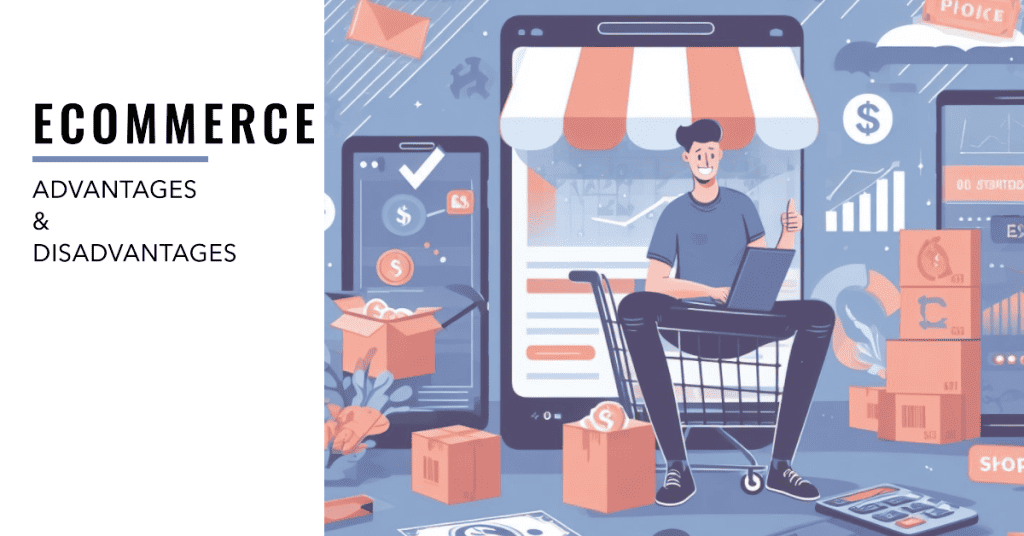Exploring the Advantages and Disadvantages Ecommerce Presents
The world of ecommerce has experienced a meteoric rise in recent years, with global e-retail sales surpassing 4.2 trillion dollars in 2020. This growth has presented businesses with both opportunities and challenges, as they navigate the digital landscape and adapt to new customer behaviors.
But what are the key advantages and disadvantages ecommerce presents in the modern market? This blog post will uncover the benefits, such as cost savings, expanded customer reach, and 24/7 sales, as well as the challenges, including shipping complexities, security concerns, and intense market competition. We will also explore the impact of ecommerce on customer shopping behaviors and discuss strategies for balancing the pros and cons to achieve ecommerce success.
Key Takeaways
- Ecommerce offers businesses cost savings, expanded customer reach and 24/7 sales opportunities.
- Challenges such as shipping complexities, security concerns and market competition must be addressed to ensure successful operations.
- A strategic approach involving the balancing of advantages and disadvantages is necessary for a successful ecommerce business through analytics, customer support & reliable web hosting services.
Online Stores Or Physical Store: Exploring the Benefits of Ecommerce for Modern Businesses

E commerce businesses, compared to their traditional brick and mortar store business counterparts, can potentially achieve significant cost savings, attract a larger clientele, and enjoy the advantage of 24/7 sales opportunities. These advantages have propelled the rapid growth of e commerce businesses, with countless businesses transitioning from physical stores to online platforms.
Indeed, numerous traditional brick and mortar shop front stores are integrating ecommerce into their operations to stay relevant in the contemporary online market, making them ecommerce stores.
Cost Savings on Physical Space
The lack of physical retail overheads can result in considerable cost reductions for ecommerce businesses. Traditional brick and mortar shops often incur hefty expenses, such as:
- Rent
- Utilities
- Insurance
- Payroll
- Inventory costs
In contrast, online businesses can operate with minimal overhead costs and more flexible budget allocations. For instance, funds that would have been spent on hiring employees, cashiers and security guards in a physical store can be redirected towards advertising and other strategies to boost online sales, including offering various services online.
Also, the non-existence of physical sales space in an ecommerce store offers several advantages:
- Spares businesses from high rental fees and initial investments in sales equipment and store fixtures
- Cost-effective aspect is particularly appealing to small businesses and startups looking to minimize expenses
- Maximizes opportunities for growth and profitability
Expanded Customer Reach

Online stores have the unique ability to inform customers who shop online and:
- Reach customers across the globe, transcending geographical boundaries that often limit the customer base of brick-and-mortar stores
- Expand their market, increasing their revenue potential and enabling rapid growth and competition with larger companies
- Facilitate the diversification of product offerings and market segments, further enhancing the prospects for success
To capitalize on this expanded reach, ecommerce businesses must employ effective marketing strategies to attract and retain customers. These may include:
- Utilizing high-quality product photographs and descriptions
- Optimizing website content for search engines
- Leveraging social media
- Investing in email marketing campaigns
By implementing these strategies, online stores can effectively broaden their customer base and drive revenue growth.
Convenience of 24/7 Sales
Ecommerce enables businesses to enjoy the ecommerce benefits and advantages such as:
- Generate revenue around the clock, as customers can shop anytime without visiting a physical store
- Increase sales potential and cater to the modern consumer’s desire for convenience and immediacy
- Simultaneously process multiple orders and handle high volumes of website traffic
- Satisfy the demands of a diverse and ever-growing customer base
Also, the increasing prevalence of mobile devices enhances the ease of online shopping, thereby boosting online retail sales even with more customers. As a result, businesses must ensure that their ecommerce platforms are optimized for mobile browsing and provide a seamless shopping experience to customers, regardless of the device they are using.
Unveiling the Challenges of Running an Online Store

Despite its many advantages, running an online store also presents a unique set of challenges, such as shipping complexities, security concerns, and intense market competition. Ecommerce businesses must be prepared to address these issues head-on to ensure their long-term success and maintain customer trust. By understanding these potential pitfalls, businesses can develop strategies to overcome them and enhance their competitive edge in the ecommerce landscape.
The succeeding sections will provide a more in-depth perspective on these challenges, explaining how businesses can handle shipping complexities, tackle security concerns, and set themselves apart in a highly competitive market.
Navigating Shipping and Handling Complexities
Shipping and handling can be a complex aspect of running an ecommerce business, as it involves coordinating logistics, managing shipping costs, and ensuring that items arrive in pristine condition. Long shipping times, especially for international orders, can deter potential customers and lead to lost sales. To address these challenges, online businesses must provide clear communication regarding expected delivery times and offer shipment tracking to keep customers informed.
Also, it is vital for businesses to consider possible duties and tariffs that international customers may incur when buying from an online store shipping merchandise aborad. By clearly outlining these costs and informing customers upfront, ecommerce businesses can ensure a transparent and smooth shopping experience, minimizing the likelihood of unexpected fees and dissatisfied customers.
Overcoming Security Concerns
Privacy and security are paramount concerns for both online retailers and shoppers, making it crucial for ecommerce businesses to invest in robust security measures. The primary security risks faced by online stores include:
- Phishing attacks
- Financial thefts
- Data breaches
- Hacking
- Malware
- Automated malicious bots
Businesses can secure customer data and transactions, build customer confidence, and minimize security breach risks by integrating advanced security protocols.
Successful ecommerce giants such as:
- Amazon
- Shopify
- PayPal
- eBay
- Alibaba
have demonstrated the importance of robust security measures in maintaining customer trust and facilitating secure transactions. By learning from these industry leaders, businesses can mitigate security risks and foster a safe and secure environment for online transactions.
Dealing with Intense Market Competition
The ecommerce market is fiercely competitive, with innumerable businesses competing for potential customers’ attention. To stand out in this crowded landscape, ecommerce businesses must differentiate themselves and develop unique marketing strategies that cater to the needs and preferences of their target audience.
Some strategies for distinguishing an ecommerce business in the competitive market include:
- Offering unique and innovative products
- Establishing an authoritative brand image
- Delivering exceptional customer service
- Utilizing engaging product images and captivating brand narratives
By focusing on these differentiators, businesses can enhance their competitive advantage and attract a loyal customer base.
start your Own Store Or Use A 3rd Party
One great way you can counter some of the negatives of starting your own store is to piggy back off an already existing ecommerce giant with more reach and visability.
Amazon in particular will help you as you will get to utilize their customers. Although of course you will pay for it as well, as they are constantly increasing their fees.
Even small and medium sized platforms will really help you get reach.
Sell on TPT, try Etsy, maybe Ebay, TikTok Shop, even Facebook marketplace or Craigslist. There really are almost too many to mention. You can treat them like channels for distribution as you will never really own your customers on these platforms. Theres always a risk to using platforms like Amazon FBA, so you should also always have your own online store even if you employ these techniques.
The Impact of Ecommerce on Customer Shopping Behaviors
Ecommerce has significantly impacted customer shopping behaviors, leading to the rise of mobile shopping, personalized experiences, and impulse buying. These trends have reshaped the way consumers interact with businesses and make purchasing decisions, requiring companies to adapt their strategies to better serve their customers.
The subsequent sections will analyze these trends and their impact on ecommerce businesses.
The Rise of Mobile Shopping

Mobile shopping has experienced tremendous growth in recent years, with retail m-commerce sales in the U.S. projected to increase from 8% in 2019 to 42% in 2022. The rise in mobile shopping can be traced back to factors like the growing number of mobile users, the ease of using smartphones, and the widespread adoption of mobile commerce. As a result, it is vital for ecommerce businesses to optimize their websites for mobile devices and provide a seamless shopping experience for customers.
To achieve this, businesses should:
- Develop mobile-friendly web designs with straightforward structures and legible fonts
- Utilize buttons that are sizable and easy to tap
- Ensure compatibility across devices with responsive design
- Improve website speed and compress images
- Avoid using Adobe Flash and pop-ups
By implementing these best practices, businesses can effectively cater to mobile shoppers and capitalize on this growing trend.
Personalized Online Shopping Experiences
Ecommerce has paved the way for personalized shopping experiences, allowing businesses to tailor their offerings, recommendations, and discounts to individual customer preferences and shopping habits. By providing personalized product suggestions based on customer data, businesses can help shoppers discover relevant products more quickly and conveniently, leading to increased satisfaction and loyalty.
Personalized discounts can improve the online shopping experience by:
- Making customers feel valued and appreciated
- Creating a sense of personalization and exclusivity
- Increasing customer satisfaction and loyalty
- Driving cross-selling and upselling opportunities for businesses
By embracing personalization, ecommerce businesses can better serve their customers and foster long-term relationships.
Impulse Buying in the Digital Age
Impulse buying has intensified in the digital era, with ecommerce businesses using strategies like appealing visuals and inducing fear of missing out (FOMO) to stimulate impromptu purchases. In fact, impulse purchases account for 40% of all money spent on an ecommerce website. While this trend presents opportunities for businesses to generate additional sales, it also raises concerns about overspending, buyer’s remorse, and the potential for fraud.
To address these concerns, businesses can adopt responsible marketing practices and provide transparent product information to help customers make informed decisions. Additionally, companies can implement features such as wishlists or save-for-later options, allowing customers to revisit items and potentially make more thoughtful purchases.
Balancing Advantages and Disadvantages: A Strategic Approach for Ecommerce Success

To achieve ecommerce success, businesses must strike a balance between the advantages and disadvantages of e commerce as presented by the digital marketplace. By utilizing analytics, enhancing customer support, and investing in reliable web hosting services, companies can navigate the challenges associated with ecommerce and maximize their potential for growth and profitability.
The following sections will detail these strategies and elaborate on how they can boost the success of small business owners an ecommerce business.
Utilizing Analytics for Informed Decision-Making
Analytics tools can play a critical role in helping businesses make informed decisions and improve their digital marketing strategies. Some popular analytics tools include:
- Mixpanel
- Crazy Egg
- Databox
- Glew.io
- Google Analytics
These tools offer comprehensive tracking, user-friendly dashboards, and insights into customer behavior and sales data. By leveraging these tools, businesses can gain valuable insights into customer preferences, optimize their marketing efforts, and establish clear goals and key performance indicators (KPIs) for success.
Apart from that, analytics tools can supply ecommerce businesses with a wealth of useful data, such as:
- Website traffic
- Conversion rates
- Customer demographics
- Sales performance
- The effectiveness of marketing campaigns
By utilizing this data, businesses can make informed decisions and refine their strategies to better serve their customers and drive revenue growth.
Enhancing Customer Support
Providing exceptional customer support is essential for retaining customers and addressing their concerns promptly. To meet customer expectations, ecommerce businesses should have a dedicated customer service team available at all times and consider integrating chatbots into their websites to ensure prompt support.
Prompt responses are crucial in ecommerce, as customers expect quick answers to their queries regarding payment, order processing, or delivery times. By offering timely and efficient support, businesses can maintain customer trust and foster loyalty, ultimately leading to repeat business and positive word-of-mouth referrals.
Investing in Reliable Web Hosting
Investment in dependable web hosting is crucial in reducing downtime and providing customers with a seamless shopping experience. Dependable web hosting guarantees high availability and scalability, preserves data safely and securely, and ensures uptime for continuous, online business presence. By selecting a reputable hosting provider with a history of high uptime and implementing regular server maintenance, businesses can reduce the chances of downtime and maintain a positive customer experience.
A reliable web hosting service should offer the following features:
- Uptime
- Reliability
- Speed
- Security
- Scalability
By investing in quality web hosting, ecommerce businesses can ensure a stable and secure platform for their online store, ultimately contributing to their long-term success and customer satisfaction.

Summary
Ecommerce presents a myriad of advantages and challenges for businesses in the modern market. The benefits of cost savings, expanded customer reach, and 24/7 sales opportunities must be weighed against the complexities of shipping, security concerns, and intense market competition. By understanding and addressing these challenges, businesses can maximize their potential for success in the ecommerce landscape.
To achieve this balance, implementing a strategic approach that includes utilizing analytics, enhancing customer support, and investing in reliable web hosting is essential. By adopting these strategies, businesses can navigate the complexities of ecommerce, capitalize on all the advantages and opportunities it presents, and ultimately thrive in today’s increasingly digital marketplace.
Frequently Asked Questions
What are the advantages and disadvantages of online selling?
Online selling provides convenience and accessibility, allowing shoppers to buy items from the comfort of their own homes. However, shipping times can be lengthy and it’s not possible for customers to inspect the item in person before buying.
What are the main benefits of ecommerce for businesses?
Ecommerce provides businesses with significant cost savings, expands their customer reach, and allows them to offer 24/7 sales convenience.
What are some challenges faced by ecommerce businesses?
Ecommerce businesses must grapple with complexities associated with shipping and handling, security risks, and cut-throat competition.
How has ecommerce impacted customer shopping behaviors?
Ecommerce has revolutionized customer shopping behaviors, allowing for increased convenience, personalization, and impulse buying opportunities.
What strategies can help ecommerce businesses achieve success?
To succeed in ecommerce, businesses should make informed decisions using analytics, provide excellent customer support, and invest in reliable web hosting.










